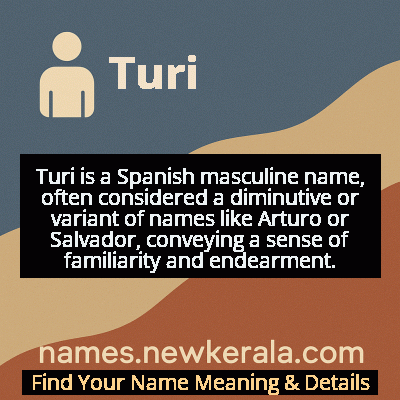Turi Name Meaning & Details
Origin, Popularity, Numerology Analysis & Name Meaning of Turi
Discover the origin, meaning, and cultural significance of the name TURI. Delve into its historical roots and explore the lasting impact it has had on communities and traditions.
Name
Turi
Gender
Male
Origin
Spanish
Lucky Number
5
Meaning of the Name - Turi
Turi is a Spanish masculine name, often considered a diminutive or variant of names like Arturo or Salvador, conveying a sense of familiarity and endearment.
Turi - Complete Numerology Analysis
Your Numerology Number
Based on Pythagorean Numerology System
Ruling Planet
Mercury
Positive Nature
Adventurous, dynamic, curious, and social.
Negative Traits
Restless, impatient, inconsistent, prone to indulgence.
Lucky Colours
Green, white.
Lucky Days
Wednesday.
Lucky Stones
Emerald.
Harmony Numbers
1, 3, 9.
Best Suited Professions
Sales, marketing, travel, entertainment.
What People Like About You
Versatility, charisma, adventurous spirit.
Famous People Named Turi
Turi Collura
Musician and Composer
Italian pianist and composer known for innovative jazz and world music fusion
Turi Simeti
Visual Artist
Prominent Italian abstract artist associated with the Zero Movement
Turi Vaccaro
Actor
Italian actor known for roles in 'La Piovra' and various theater productions
Turi Ferro
Actor
Celebrated Sicilian actor with extensive theater and film career spanning decades
Name Variations & International Equivalents
Click on blue names to explore their detailed meanings. Gray names with will be available soon.
Cultural & Historical Significance
In Sicilian culture specifically, Turi (often as Turiddu) holds literary and operatic importance through works like Pietro Mascagni's 'Cavalleria Rusticana,' where the character Turiddu represents the tragic, passionate Sicilian spirit. The name appears in numerous folk tales and regional stories, often given to characters who embody traditional values, strength, and loyalty to family. Throughout history, the name has maintained its regional authenticity, rarely becoming mainstream but remaining a cherished choice in communities valuing heritage and cultural continuity. This cultural embeddedness makes Turi more than just a name—it's a connection to specific geographic identities and historical narratives.
Extended Personality Analysis
Individuals named Turi typically exhibit personality traits that reflect their bear-inspired meaning and Mediterranean origins. They are often characterized by a unique blend of strength and sensitivity—powerful when circumstances demand but equally capable of deep emotional connection and nurturing behavior. This duality mirrors the bear's nature as both a formidable forest creature and a protective parent. Turis tend to be grounded, practical individuals who value stability and tradition while maintaining independent thinking.
Their Mediterranean heritage often manifests in passionate, expressive personalities with strong family loyalty and community ties. They're typically reliable friends and partners who approach relationships with sincerity and depth. The name suggests someone with natural leadership qualities who leads through example rather than authority, embodying the bear's solitary yet protective nature. Turis often possess strong intuition and problem-solving skills, approaching challenges with methodical determination. Their personality combines the bear's symbolic attributes of courage, protection, and connection to natural cycles with the warm, expressive character of Southern European cultures, creating individuals who are both resilient and emotionally rich.
Modern Usage & Popularity
In contemporary naming practices, Turi maintains a niche but meaningful presence, particularly among families with Spanish or Italian heritage seeking to honor their cultural roots. While not ranking in top name charts globally, it has experienced a modest resurgence as part of the trend toward unique, culturally significant names that stand out from more common choices. The name is most popular in Southern Italy, Sicily, and certain Spanish-speaking regions where traditional names remain valued. Internationally, Turi appeals to parents attracted to short, strong-sounding names with clear meaning and historical depth. Its bear symbolism resonates with growing interest in nature-inspired names, while its Mediterranean origins align with the popularity of Italian and Spanish names in global naming trends. The name's simplicity—easy to spell and pronounce across languages—makes it accessible while maintaining cultural specificity, positioning it as an ideal choice for families wanting heritage connection without overwhelming uniqueness.
Symbolic & Spiritual Meanings
Symbolically, Turi encompasses rich layers of meaning derived from both its literal translation as 'bear' and its cultural associations. The bear symbolism represents primal strength, wilderness independence, and protective instincts—qualities revered across European folklore. In Spanish tradition, bears symbolize courage and resilience, often depicted as noble creatures standing their ground. The bear's hibernation cycle adds symbolism of renewal, introspection, and the natural rhythms of life. Metaphorically, Turi represents the 'sovereign of the forest'—someone who commands respect through inherent strength rather than aggression, embodying quiet authority and self-sufficiency.
The Mediterranean cultural context adds layers of passion, family loyalty, and connection to the earth. The name suggests someone deeply rooted in their heritage while possessing the strength to navigate modern complexities. Symbolically, Turi bridges the wild and the domestic—the bear's forest domain and the human community—representing individuals who maintain their essential nature while fulfilling social roles. This symbolic richness makes the name carry connotations of authenticity, resilience, and the balance between power and compassion that defines truly strong character.

